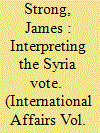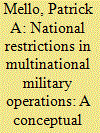| Srl | Item |
| 1 |
ID:
141287


|
|
|
|
|
| Summary/Abstract |
This article presents three distinct interpretations of how parliamentary war powers affect British foreign policy more generally, based on a detailed analysis of the debate preceding the vote in parliament in August 2013 on whether Britain should intervene in the Syrian civil war. The first interpretation treats parliament as a site for domestic role contestation. From this perspective, parliamentary war powers matter because they raise the significance of MPs' doubts about Britain's proper global ‘role’. The second interpretation treats parliament as a forum for policy debate. There is nothing new about MPs discussing international initiatives. But now they do more than debate, they decide, at least where military action is involved. From this perspective, parliamentary war powers matter because they make British foreign policy more cautious and less consistent, even if they also make it more transparent and (potentially) more democratic in turn. The final interpretation treats parliament as an arena for political competition. From this perspective, parliamentary involvement exposes major foreign policy decisions to the vagaries of partisan politicking, a potent development in an era of weak or coalition governments, and a recipe for unpredictability. Together these developments made parliament's war powers highly significant, not just where military action is concerned, but for British foreign policy overall.
|
|
|
|
|
|
|
|
|
|
|
|
|
|
|
|
| 2 |
ID:
166603


|
|
|
|
|
| Summary/Abstract |
Recent scholarship in security studies has started to explore the causes and consequences of various forms of national restrictions in multinational military operations (MMOs). This article makes a conceptual contribution to this literature by developing a theoretical framework of national restrictions in MMOs that distinguishes between structural, procedural, and operational restrictions. I argue that these types of restrictions are governed by different causal mechanisms. Structural restrictions are relatively stable over time and effect deployment decisions irrespective of other factors. Procedural restrictions, on the other hand, can constitute veto points against deployment only in combination with distinct political preferences. Finally, operational restrictions directly affect the rules of engagement of troop contributing countries. The article illustrates the three types of restrictions and their interaction with empirical examples from a range of countries and sketches their impact on MMO deployment decisions and mandates.
|
|
|
|
|
|
|
|
|
|
|
|
|
|
|
|